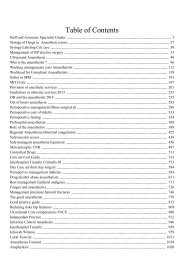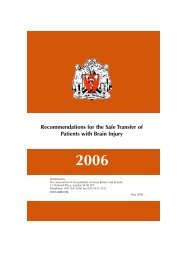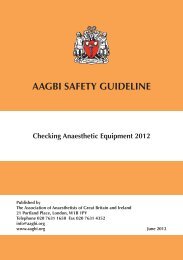TheatrePracticeStandardsGeneric1
Create successful ePaper yourself
Turn your PDF publications into a flip-book with our unique Google optimized e-Paper software.
• Protective face shields must be worn whenever activities place personnel at risk of<br />
splashes or aerosol contamination.<br />
• Masks must cover the nose and mouth, fitting the contour of the face and must be<br />
tied securely. They must be changed between patients.<br />
• The mask should not be touched once applied. A used mask must be handled by<br />
the tapes only.<br />
• Used masks must be discarded into a yellow clinical waste bag for disposal after<br />
each case, or if soiled.<br />
• Masks must not be worn around the neck or put into pockets for future use. Hands<br />
must be washed following mask removal.<br />
• When caring for patients with suspected or confirmed influenza, all healthcare<br />
workers need to – prior to any patient interaction – assess the infectious risk<br />
posed to themselves and wear the appropriate personal protective equipment<br />
(PPE) to minimise that risk: Face masks with shields - Surgical mask with<br />
intermediate filter to ensure high protection against bacterial contamination<br />
Personal Hygiene<br />
• Personal hygiene should be of a high standard.<br />
• Showers and towels are provided, for staff accidentally contaminated with body<br />
fluids whilst on duty.<br />
2. Patient Attire<br />
• Patients in preparation for surgery must wear suitable clothing<br />
• Patients will be supplied with disposable underwear to maintain privacy and dignity<br />
• Patient gowns should be correctly fitting to enable them to be securely closed at<br />
the rear to maintain privacy and dignity<br />
• Patients who walk to theatre must be allowed to wear their own dressing gown<br />
over the patient gown and if they do not have their own gown they must be<br />
provided with a disposable gown to cover the patient gown during the transfer<br />
• Patients must wear appropriate footwear during walking transfers to theatre to<br />
maintain safety.<br />
• Patients undergoing procedures which do not require them to change out of their<br />
own clothes e.g ophthalmic procedures must have their own clothing protected<br />
during the procedure.<br />
3. Visitors to the perioperative environment<br />
All theatres must have available a copy of the RCHT Protocol: Perioperative Uniform, stating<br />
the correct preparation for staff and visitors entering and leaving all areas of the perioperative<br />
environment. Staff/visitors other healthcare professionals must be made aware of these<br />
policies and procedures.<br />
Theatre Practice Standards - Generic<br />
Page 8 of 105





